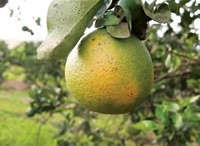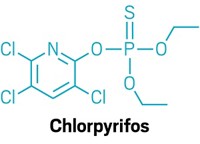Advertisement
Grab your lab coat. Let's get started
Welcome!
Welcome!
Create an account below to get 6 C&EN articles per month, receive newsletters and more - all free.
It seems this is your first time logging in online. Please enter the following information to continue.
As an ACS member you automatically get access to this site. All we need is few more details to create your reading experience.
Not you? Sign in with a different account.
Not you? Sign in with a different account.
ERROR 1
ERROR 1
ERROR 2
ERROR 2
ERROR 2
ERROR 2
ERROR 2
Password and Confirm password must match.
If you have an ACS member number, please enter it here so we can link this account to your membership. (optional)
ERROR 2
ACS values your privacy. By submitting your information, you are gaining access to C&EN and subscribing to our weekly newsletter. We use the information you provide to make your reading experience better, and we will never sell your data to third party members.
Pesticides
No safe exposure to chlorpyrifos, EU regulators say
Food safety authority finds insecticide does not meet criteria for renewal
by Britt E. Erickson
August 5, 2019

No safe exposure level can be set for the pesticide chlorpyrifos, the European Food Safety Authority says in an Aug. 2 statement. The announcement suggests that the European Union is unlikely to allow chlorpyrifos use after its approval expires in January.
A peer-review panel is currently evaluating applications for chlorpyrifos renewal in the EU. Those applications were submitted by manufacturers Corteva Agriscience (formerly Dow AgroSciences), Adama Agriculture, and Sapec Agro. Chlorpyrifos is an organophosphate insecticide used on a large number of crops worldwide.
In July, the European Commission asked EFSA to weigh in on the mammalian toxicology and human health effects of chlorpyrifos. European regulators identified two areas of concern: neurodevelopmental effects in children—effects that are supported by epidemiological studies—and potential genotoxic effects. The pesticide “does not meet the criteria required by legislation for the renewal of its approval in the European Union,” EFSA says in its statement.
Corteva Agriscience disputes that conclusion. “No active ingredient had been more thoroughly researched than chlorpyrifos,” the company says in a statement. “The EFSA conclusions do not match the conclusions of other major regulatory bodies.”
Last month, the US Environmental Protection Agency announced that chlorpyrifos can stay on the US market. The pesticide has been at the center of a legal fight in the US since 2007, when environmental and farmworker groups first petitioned the EPA to ban use of chlorpyrifos on food crops. The EPA agreed to the ban under the Obama administration because of concerns about health risks to children. The agency reversed that decision in March 2017, under the Trump administration.
“The EU is doing what the science demands: putting public health ahead of the narrow interests of the pesticide industry,” Ken Cook, president of the Environmental Working Group, an advocacy group, says in a statement. “Tragically for American kids and their parents, the Trump administration is kowtowing to chemical agribusiness and allowing a dangerous pesticide to be sprayed on foods children eat every day.”





Join the conversation
Contact the reporter
Submit a Letter to the Editor for publication
Engage with us on Twitter